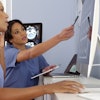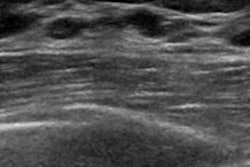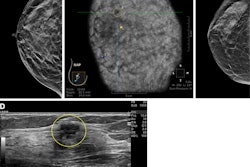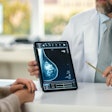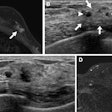Dear AuntMinnie Member,
Researchers continue to evaluate various breast cancer screening strategies for women that extend past conventional mammography, with ultrasound, MRI, and AI thrust into the spotlight as methods for better detection of breast cancers for particular patient populations.
A team from the University of Texas Southwestern Medical Center outlined how a diagnostic ultrasound-first strategy can be cost-effective when imaging noncalcified lesions recalled on digital breast tomosynthesis. Researchers sat down with AuntMinnie.com to discuss how this strategy can save on healthcare costs without sacrificing quality. Find out what they had to say in this edition’s featured story.
Speaking of ultrasound, researchers from the University of Vermont found that women at elevated risk of invasive or advanced breast cancer had high supplemental cancer detection rates on ultrasound screening after a negative mammogram. Another study from investigators at Seoul National University Hospital in South Korea found that combining mammography and supplemental ultrasound delivers better results than relying only on AI-enhanced mammography assessment in screening women with dense breasts.
We're also highlighting research from the Harvey L. Neiman Health Policy Institute that found that women on average have to travel further to breast MRI and ultrasound facilities than they do to mammography facilities. Lead author Eric Christensen, PhD, told AuntMinnie.com that one possible solution for this is more contrast-enhanced mammography (CEM) offerings at mammography facilities.
Other studies exploring breast cancer care include how DBT can lead to cancers being detected earlier and how a theranostics pairing of molecular imaging targeting and radioligand therapy can treat metastatic breast cancer.
In other news, research teams are exploring trends in breast cancer screening attendance. One study out of Johns Hopkins Medicine in Baltimore, MD, suggested that more women are using online self-scheduling for screening mammography. Another found that women may delay breast cancer screening after learning more about the pros and cons of undergoing annual screening mammography.
Finally, radiologists have new resources they can make use of in a changing medical world. A pilot initiative at the New York Presbyterian - Weill Cornell Medical Center highlighted the success of a breast pump made available for female radiologists returning from maternity leave, while another study outlined how radiologists can navigate the legal landscape in performing imaging on pregnant and pregnancy-capable women.
Do you think there’s something missing here, like research you think would be great for AuntMinnie.com’s audience? Drop us a line and we’ll be sure to check it out! In the meantime, take a look at our Women’s Imaging section for the latest in research and issues related to breast imaging, ob/gyn imaging, and more.


